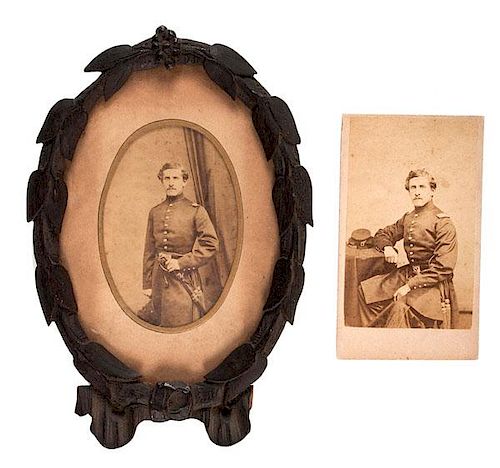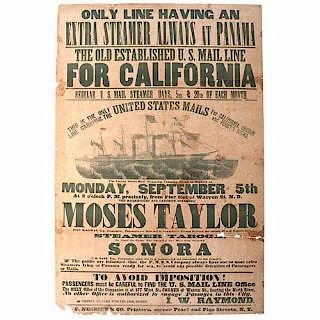Major Isaac Harris Hooper, 15th Massachusetts Infantry, WIA Twice and POW Twice, Archive Incl. Letter from Gettysburg, Ca 1855-1873
About Seller
6270 Este Ave.
Cincinnati , OH 45232
United States
With offices in Cincinnati, Cleveland and Denver, Cowan’s holds over 40 auctions each year, with annual sales exceeding $16M. We reach buyers around the globe, and take pride in our reputation for integrity, customer service and great results. A full-service house, Cowan’s Auctions specializes in Am...Read more
Two ways to bid:
- Leave a max absentee bid and the platform will bid on your behalf up to your maximum bid during the live auction.
- Bid live during the auction and your bids will be submitted real-time to the auctioneer.
Bid Increments
| Price | Bid Increment |
|---|---|
| $0 | $25 |
| $500 | $50 |
| $1,000 | $100 |
| $2,000 | $250 |
| $5,000 | $500 |
| $10,000 | $1,000 |
| $20,000 | $2,500 |
| $50,000 | $5,000 |
| $100,000 | $10,000 |
About Auction
Jun 10, 2016 - Jun 11, 2016
Cowan's Auctions dawnie@cowans.com
- Lot Description
Major Isaac Harris Hooper, 15th Massachusetts Infantry, WIA Twice and POW Twice, Archive Incl. Letter from Gettysburg, Ca 1855-1873
Lot of approx. 80 items.
Status and wealth saved many able-bodied young men from the front lines, but Isaac Harris Hooper (known to his family and friends as Harris) chose to dirty his pressed shirts of privilege and exchange them for a blue Union uniform. When news of the attack on Sumter reached Isaac’s father, Henry N. Hooper, he immediately telegraphed his son: “Harris, you know your duty” Henry’s answer came at once: “I leave to-night.” Isaac’s letter archive primarily consists of 76 letters spanning from the beginning of his business in 1855 to his enlistment papers in 1861, and his military service in 1863 until his second internment at Libby prison that summer. In addition to his letters, his discharge papers from the 13th NY, 2 commissions while in the 15th MA, and 2 CDVs of Isaac as 2nd lieutenant, one housed in its original frame with an inscription on the back describing his Civil War service record, including when he was captured and wounded, accompany the lot.
Isaac mustered in as a private in the 13th NY Inf. on April 23, 1861. One can imagine that the 22 year-old registered at such a low ranking position to either prove that his fortunate background did not define him or that (after five years of running his own store in Brooklyn) he was his own man. Regardless of his motivations, courage and merit earned Isaac an impressive military career. After three months of service with the 13th NY, Isaac gained an honorable discharge. Determined to serve his country more, he was commissioned into the 15th MA Inf. Co. K as a 2nd lieutenant. on October 8, 1861. A few weeks after joining the 15th MA, rebel soldiers captured him at Ball’s Bluff. Frustrated, he wrote in his personal diary, "Captured at 6p.m. on the 21st day of October 1861 after the disastrous battle which took place on that day on the banks of the Potomac...” (personal diary, Lot 166, Cowan’s, December 9, 2009). The Civil War database listed him as wounded at Fredericksburg on December 13, 1862; however, another source reported that he was part of a prisoner exchange under the flag of truce in February 1862. Whether by escape or exchange, Isaac returned to the front as 1st lieutenant, earning the rank of major by April 17, 1863. He wore the major straps Major Sedgwick wore at Antietam and Joslin wore at the second Fredericksburg on his uniform until he gained his own (Stafford Hills, May 16, 1863).
Five days before his promotion to major, a venerated guest visited Isaac and his regiment:
Father should have remained one day longer with us for on Wednesday last four Corps. were received by A. Lincoln Our worthy President, held his hat with his wanted(?) firmness, and made us a second bow, when he was informed by Genl Gibbon that that Regiment fought at Ball’s Bluff. We were told that he desired to be told when the Balls Bluff Regt marched past his stand… (April 12, 1863).
Isaac wrote to his large family often. He spoke to his mother about his diet and camp life. He discussed artillery weapons his father’s company produced. He spoke about the scenery to his sisters, but wrote the most detailed letters to his brother, a lieutenant colonel of the 54th US Colored Inf., whom he most likely felt understood the horrors of war. After leading his men through the carnage at Fredericksburg, he wrote to his brother, Henry Jr.:
On Sunday last our division was engaged in arresting Genl Sedgwick who commanded the 11th Corps to take the city and heights of Fredericksburg—We crossed at the old place, and formed lines of battle for a mile to the right of the town thus causing the enemy to fill his rifle pits with men, and to plant cannon in his works to permit our flanking them…At about noon Sedgwick stormed, and caused the hills on the left, and we found him, but were soon ordered back into the city and afterwards to this side of the river—The enemy now hold their former position in every respect, and we all first where we were two weeks ago…The whole affair is as blind to us, as at first, except the fact that we have lost some thousands of men, and were perhaps outgeneraled….(Lace House, May 8, 1863).
Mixed with banter, he wrote to his friend and cousin, William Simpkins, a captain of the 54th USCT, a few days later with news of the nearby battle of Chancellorsville:
A deserter came over last night, delivered himself up to one of our Capts…He reported that “Stonewall” Jackson was not only dead, but buried last Sunday—I would just like to have that little bit of information publically announced as a fact—But he has hereafter lost so many arms, legs etc and their remained so little of him to kill, that I am an [illegible] in the welcome tidings…(On the safe side of “ye noble Rappahannock”, May 12, 1863).
In September, Isaac wrote to Lt. Colonel John Bedel inquiring about his missing family member. Bedel responded:
I am not able to give you any information in regard to Capt. Simpkins. No one of the 27 officers now in [Richland] jail has any positive knowledge relative to his destiny. Capt. Payne of the 100th CT 7 Vols, who was taken Aug 3rd reports that while he was in Charleston Hospital that he understood that a Capt of the 54th Mass Vols had been captured and had escaped or broken his parole and been recaptured, but he had no means of stating positively that his name was Simpkins though the name strikes him as sounding familiar…(Period Copy, Richhland Jail, Sept 23rd 1863).
Captain Simpkins was not the escaped officer. He died during the disastrous attack on Fort Wayne in July of 1863.
Isaac pushed on, he and his company marched passed dead horses and over top of skulls on the deserted battlefields near Thoroughfare’s Gap and were attacked by rebel forces (Thoroughfare’s Gap, June 24, 1863 and Edward’s Ferry, June 27, 1863). He fought in the thickest of the fight, showing the greatest bravery at Antietam and Gettysburg. At Gettysburg he wrote to his mother:
I am safe so far—Our regiment has suffered terribly—Col Ward is dead, also two Captains, and one Lieut dying and several other officers wounded—We arrived at this place with two hundred and twenty one muskets and have but sixty this morning—Everything appears to be going on well—We trust to win a glorious victory—No fighting of any consequence this morning.
The enemy seem to be retiring. The 19th and 20th Regmts have suffered as much as we. Col. Revere was mortally wounded. His regiment has but three officers left in it for duty….(July 4, 1863).
In White Plains, VA, Confederates captured and detained Isaac at Libby Prison a second time. He dramatically escaped from prison with 118 officers through a tunnel on February 9, 1864. He returned to the front March 28, 1864 and resumed fighting at the Battle of the Wilderness and Spotsylvania. He was wounded a second time on June 22, 1864 at Petersburg. His valiant efforts and unrelenting spirit earned him a position as lieutenant colonel and a commission into the field and staff of the 62nd MA Inf. on March 2, 1865. He was never mustered into the position because the regiment was never completed. Four months later, Isaac ended his military career.
Isaac married Harriett G. (Rice) Thayer in 1871 but their bliss lasted only two years. He died of tuberculosis, a disease he contracted at Libby prison. After hearing of his death, American clergyman, hymn writer, and brother of Henry Wadsworth Longfellow, wrote to his sister:
It is long since I have seen him: but I retain a very warm and affectionate remembrance of him. To all who were near and dear to him, his kind, true, brave soul is a treasure that can never be taken away: and for which they must always be thankful. Over that death has no power, nor can it be so changed that it should ever cease to be near in unseen influences of love and strength….(Cambridge, April 15, 1873).
Provenance: Descended Directly in the Family of Henry Northey Hooper, Jr.Most of the letters are in good condition with some fading of the ink.Condition
- Shipping Info
-
SHIPPING. At the request of the buyer, Cowan's will authorize the shipment of purchased items. Shipments usually occur within two weeks after payment has been received. Shipment is generally made via UPS Ground service. Unless buyer gives special instructions, the shipping method shall be at the sole discretion of Cowan's Auctions, Inc.. Cowan's is in no way responsible for the acts or omissions of independent handlers, packers or shippers of purchased items or for any loss, damage or delay from the packing or shipping of any property.
-
- Buyer's Premium



 EUR
EUR CAD
CAD AUD
AUD GBP
GBP MXN
MXN HKD
HKD CNY
CNY MYR
MYR SEK
SEK SGD
SGD CHF
CHF THB
THB

















